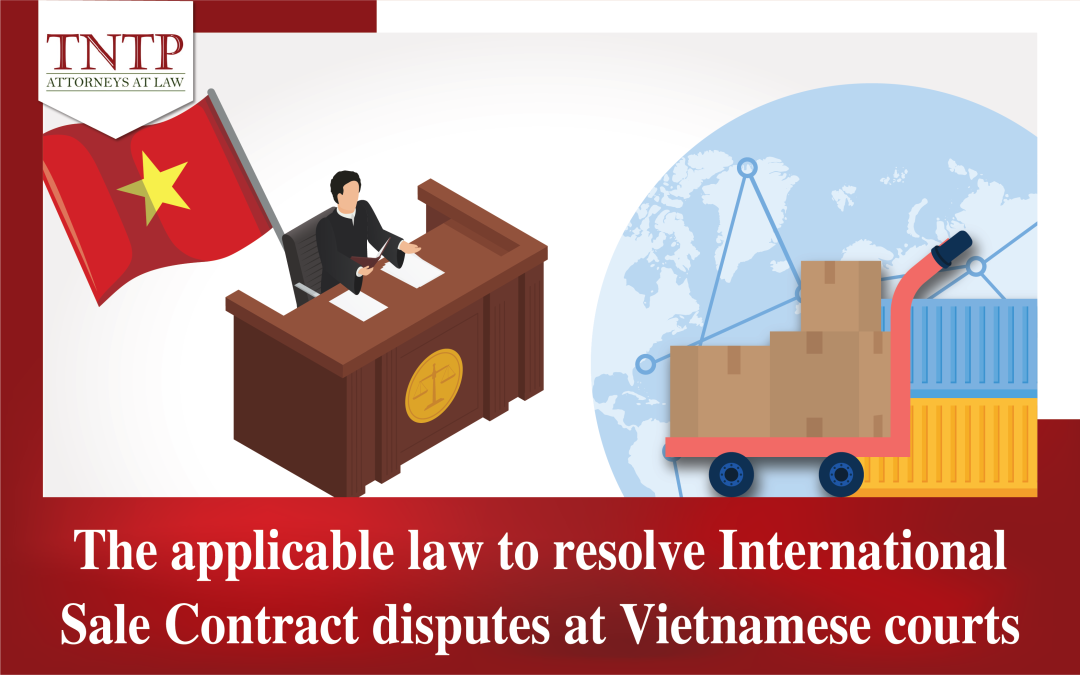An international sale contract (“ISC”) is an agreement for the sale and purchase of goods with foreign elements, where one party acts as the seller and the other as the buyer. The seller has obligations related to the delivery of goods, transferring ownership to the buyer, and receiving payment; conversely, the buyer is obligated to pay the seller, receive the goods, and obtain ownership as agreed. The nature of ISC is a civil relationship, but it is more unique due to foreign elements. Therefore, the law applied to resolve disputes related to ISC is more diverse and complex.
1. Procedural law applied to resolve International Sale Contract disputes in Vietnamese courts
According to Clause 3, Article 2 of the Civil Procedure Code 2015, the procedures for resolving civil disputes with a foreign element must follow the regulations set out in the Civil Procedure Code 2015. If there are international treaties to which Vietnam is a signatory provide otherwise, the provisions of such international treaties shall apply.
Thus, given its nature as a civil relationship with foreign elements, the procedural law applied to resolve ISC disputes in Vietnamese courts can either be Vietnamese procedural law or foreign procedural law as stipulated in the international treaty to which Vietnam is a party. Specifically:
– If an international treaty of which Vietnam is a member stipulates the application of foreign procedural law, Vietnamese courts will apply the foreign procedural law to conduct proceedings in Vietnam. However, the application of foreign law must not contravene Vietnamese legal principles. For example, Clause 1 Article 7 of the Treaty Between The Socialist Republic of Vietnam and The Russian Federation on Mutual Legal and Judicial Assistance in Criminal and Civil Matters, effective in 2012 provides: “When carrying out a request for legal assistance, the requested authority shall apply the law of its nation. At the request of the requesting authority, the requested authority may apply the procedural rules of the Requesting Party, provided that those rules are not contrary to the law of the Requested Party”.
– Aside from cases where foreign procedural law is applied according to international treaties, disputes related to ISC that fall under the jurisdiction of Vietnamese courts will be resolved according to Vietnamese procedural law.
2. Substantive law applied to resolve International Sale Contract disputes in Vietnamese courts
When resolving disputes related to ISC, the court must consider issues related to the legal personality of the parties to enter into the contract and the substantive content of the contract.
2.1. Applied law to determine the legal personality of Parties to enter into an International Sale Contract
According to Articles 673 and 676 of the Civil Code 2015, the legal personality of the parties is determined as follows:
– For natural person: The legal personality of a natural person shall be determined according to the law of the country of which he/she holds nationality. A foreigner in Vietnam shall have a legal personality in the same manner as a Vietnamese citizen unless otherwise provided by the law of Vietnam.
– For juridical persons: The legal personality of a juridical person and the responsibilities of a juridical person and its members pertaining to its obligations shall be determined in accordance with the law of the country of which such juridical person holds nationality. The nationality of a juridical person shall be determined according to the law of the country in which such juridical person was established. Where a foreign juridical person establishes or performs civil transactions in Vietnam, its legal personality shall be determined in accordance with the law of Vietnam.
2.2. Applied law to resolve issues related to the content of the International Sale Contract
According to Article 683 of the Civil Code 2015, parties may agree to select the applied law for ISC. In case the parties fail to agree or cannot reach an agreement, the law of the country with which such ISC is most closely connected shall apply.
– Application of the law chosen by the Parties: The general principle for determining the applicable law for the dispute is to prioritize the law chosen by the parties. Therefore, Clause 1 Article 683 of the Civil Code 2015 allows Parties to agree on the law they wish to apply to resolve disputes. Furthermore, contracting parties in ISC may agree to change the applied law provided that such change does not affect the rights and interests of a third party before changing, otherwise agreed by the third party.
– Application of the law of the country with which such contract is closely associated: If the Parties do not choose the applicable law, the law of the country with which such ISC contract is most closely connected will apply. According to Point a Clause 2 Article 683 of the Civil Code 2015, the law of the country with which the contract is most closely connected is the law of the country where the seller being a natural person resides or the seller being a juridical person is established. However, Clause 3 Article 683 of the Civil Code 2015 allows for the application of the law of another country if there is evidence that the law of that country has an association with the contract more closely than the country specified in Clause 2.
Thus, when resolving disputes related to ISC where the parties have not agreed on the applicable law, the chosen law could be Vietnamese law or foreign law, depending on which law is closely associated with ISC.
Above is the article “The applicable law for resolving international sale contract disputes at Vietnamese courts”. TNTP hopes that the article is helpful to readers.
Sincerely,







